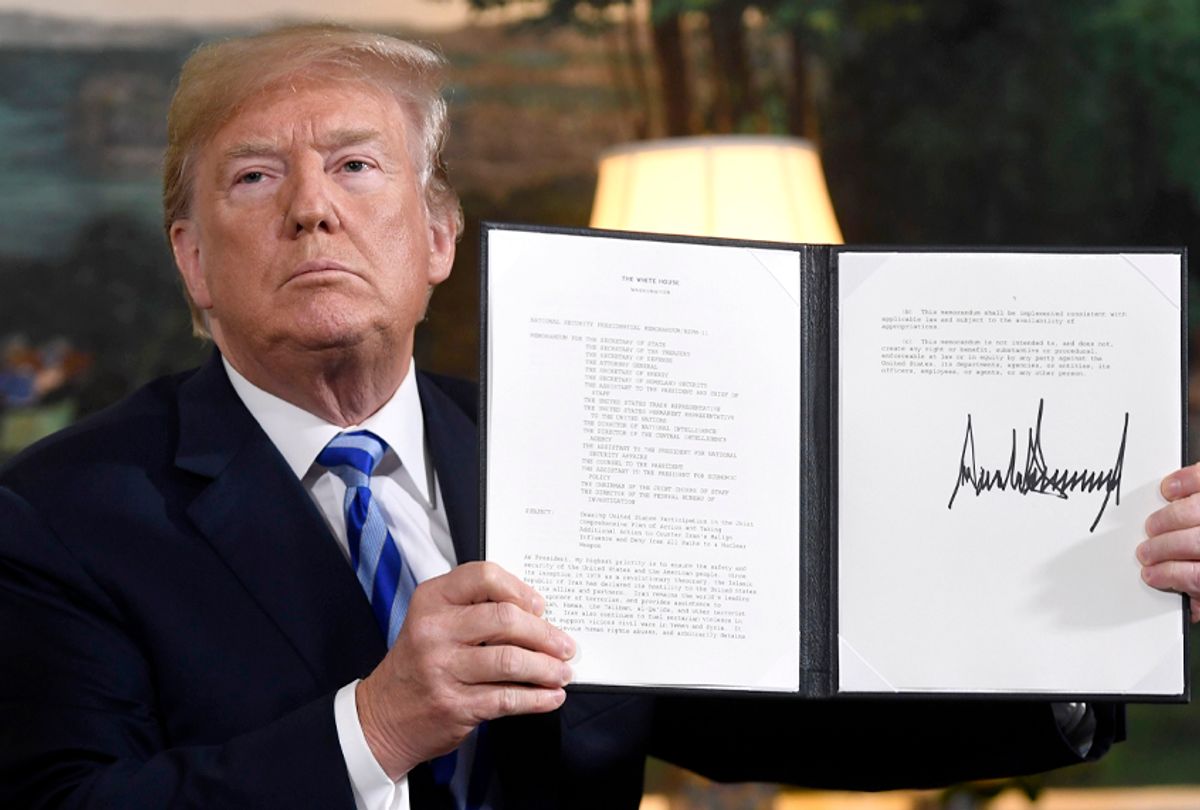President Donald Trump formally announced on Tuesday afternoon that the United States will leave the Iran nuclear deal, formally known as the Joint Comprehensive Plan of Action, calling it “defective at its core.”
Trump began his speech on Tuesday by denouncing the Iranian regime, and the deal, which (perhaps not coincidentally) was negotiated under Barack Obama.
“A constructive deal could have easily been struck at the time, but it wasn’t,” Trump said during his speech. “At the heart of the Iran deal was a giant fiction that a murderous regime only desired a peaceful nuclear energy program.”
The president continued by referring to last week's publication by the Israeli government of purported intelligence documents “long concealed by Iran,” in Trump's words, which allegedly showed that the Tehran regime had a long history of pursuing nuclear weapons.
“The fact is, this was a horrible one-sided deal that should have never ever been made,” Trump continued. He added that the deal was a “great embarrassment to me as a citizen and to all citizens of the United States.”
Trump had until May 12 to decide whether or not he wanted to waive sanctions against Iran, as the agreement specified. Following his official announcement, Trump signed a presidential memorandum to reinstate "the highest level of economic sanctions" against the Iranian government.
“In the years since the deal was reached, Iran’s military budget has grown by almost 40 percent — while its economy is doing very badly,” he said. “After the sanctions were lifted, the dictatorship used its new funds to build its nuclear-capable missiles, support terrorism, and cause havoc throughout the Middle East and beyond.”
Trump positioned the move as one supported by European allies like France, a dubious claim given widespread reports that Western leaders were trying to convince him to stick to the original terms of the 2015 agreement. Shortly after Trump's announcement, French President Emmanuel Macron responded on Twitter.
“France, Germany, and the UK regret the U.S. decision to leave the JCPOA,” Macron tweeted. “The nuclear non-proliferation regime is at stake.”
Trump said during his speech on Tuesday, however, that the U.S. had engaged “extensively with our allies and partners around the world, including France, Germany and the United Kingdom.”
“We have also consulted with our friends from across the Middle East,” Trump said. “We are unified in our understanding of the threat and in our conviction that Iran must never acquire a nuclear weapon.”
He claimed the move should signal a “critical message” to the world: “The United States no longer makes empty threats. When I make promises, I keep them.”
Trump had one more surprise up his sleeve on Tuesday, confirming rumors that Secretary of State Mike Pompeo was en route to North Korea and that the planned summit between Trump and Kim Jong-un was moving forward.
“In fact, at this very moment, Secretary Pompeo is on his way to North Korea in preparation for my upcoming meeting with Kim Jong-un," the president said. "Plans are being made, relationships are building. Hopefully, a deal will happen, and with the help of China, South Korea and Japan, a future of great prosperity and security can be achieved for everyone.”
Former President Obama posted a lengthy statement on Facebook shortly after Trump's decision was announced, calling it "misguided," and emphasizing that it likely puts America in a vulnerable position.
"Walking away from the JCPOA turns our back on America’s closest allies, and an agreement that our country’s leading diplomats, scientists, and intelligence professionals negotiated," Obama said in the statement. "In a democracy, there will always be changes in policies and priorities from one Administration to the next. But the consistent flouting of agreements that our country is a party to risks eroding America’s credibility, and puts us at odds with the world’s major powers."
Some House Democrats are calling the move an “international crisis,” in a statement drafted collectively by Reps. David Price, D-N.C., Gerry Connelly, D-Va., Jan Schakowsky, D-Ill., Lloyd Doggett, D-Texas, John Yarmuth, D-Ky., Barbara Lee, D-Calif., Peter Welch, D-Vt., and Earl Blumenauer, D-Ore.
"In refusing to waive sanctions that were lifted as part of the Iran Nuclear Agreement, President Trump has manufactured an international crisis that risks an armed conflict with a nuclear Iran,” they said in a statement. “President Trump has consistently demonstrated his ignorance of the complexity of the world's challenges and today's decision further highlights his inability to protect U.S. interests abroad."
Jon Rainwater, executive director of Peace Action, also criticized the move. “Trump’s short-sighted, politically motivated abdication of U.S. commitments under the Iran agreement is cause for alarm,” he said in a statement. “Iran has warned that it may withdraw from the agreement if Trump’s actions deprive it of economic benefits it was promised under the deal, so this move could spell doom for the successful nuclear pact, and with it all of the restrictions and checks on Iran’s nuclear program.”



Shares